Stanford GSB Researchers Discuss the Ideas They’re Most Excited About
If you’re looking for smart answers to complex questions, then you should check out this new podcast.
May 09, 2024
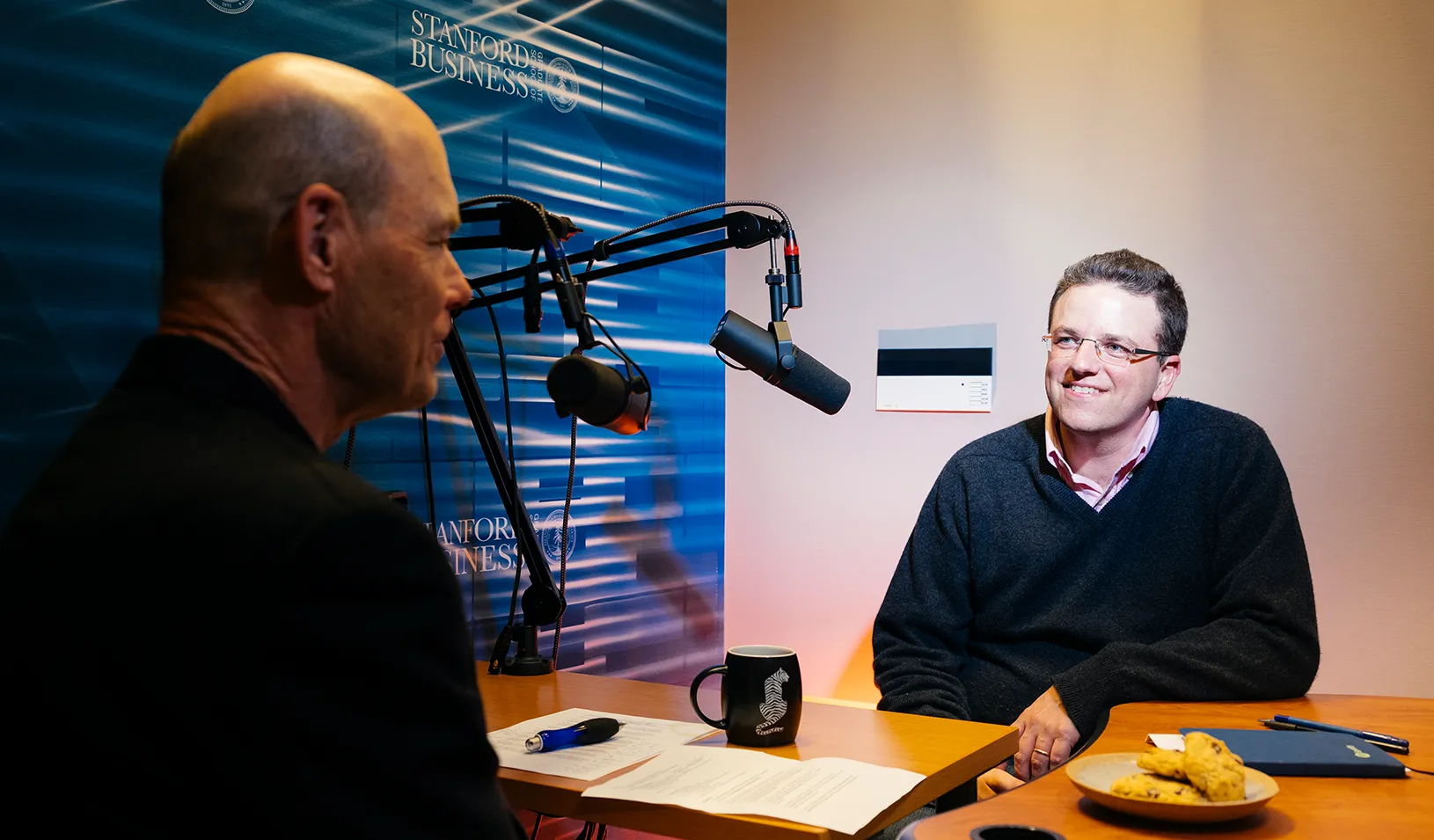
‘If/Then’ host Kevin Cool (left) speaks with Professor Andy Hall in the GSB podcasting studio. | Elena Zhukova
The Stanford Graduate School of Business’s more than 150 professors publish nearly 250 research papers annually. Their findings make waves in their respective fields, but their authors often don’t get a chance to share them with a larger audience of business leaders looking for timely and useful ideas. That’s where If/Then comes in.
If/Then is a new podcast that captures the breadth and depth of the research done at the GSB and its connections to our lives, our work, and our future. Hosted by former Stanford magazine editor and GSB senior editor Kevin Cool, each episode features a conversation with a faculty member about the research they’re most excited about — and why it matters.
The podcast’s first season launched in January. Here are some soundbites from the first 13 episodes.
Bill Barnett on the importance of foolish ideas
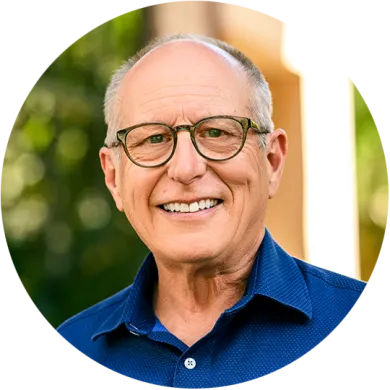
William P. Barnett is the Thomas M. Siebel Professor of Business Leadership, Strategy, and Organizations at Stanford GSB. | Winni Wintermeyer
“People like to call Steve Jobs a visionary.… But Steve Jobs himself was famous for saying that, in fact, you cannot connect the dots looking forward; you can only connect the dots looking backwards. And that tells you the map to follow looking forwards because the surprises that come along are typically vastly more impressive than anything our limited imaginations could have conceived of as we look forward. So what does that mean in terms of innovation?
“Focus less on whether or not your ideas are agreed to by everybody. If people are agreeing with your ideas, that’s actually a bad sign because that means your ideas are completely consistent with our outlook right now…. So what you really want to do is try to make sure that whatever ideas you’re putting forward are unique, are non-consensus. If they’re non-consensus, they might well be foolish, but if they’re right, they’re going to be genius. In that sense, foolishness is the price of genius. Organizations that create lots of foolishness also create a lot of genius.”
Deborah Gruenfeld on our hardwired response to power dynamics
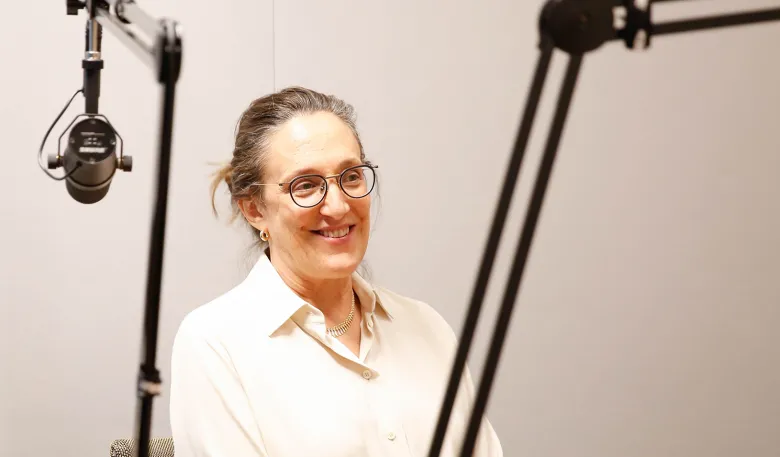
Deborah H. Gruenfeld is the Joseph McDonald Professor and Professor of Organizational Behavior at Stanford GSB. | Julia Yu
“One of the conclusions from our research on power is that what power does to people is bring out their most basic instincts and impulses. And because of how we’re socialized in the world, there are people for whom power is very attractive and it’s easy for them to see themselves in positions of power and they like the idea of having control, and there are people who don’t really want to step into the arena….
“My sense has always been that because of some of the fears about being in positions of power, I think there is a lot of fear about the level of responsibility that comes with power and the difficult choices that you’d have to make. There are a lot of people who really avoid those positions. And I think the world would be better if there were people who were willing to take on positions of power out of responsibility for other people as opposed to being driven to power for more personal reasons.”
Mohammad Akbarpour on Taylor Swift and efficient markets
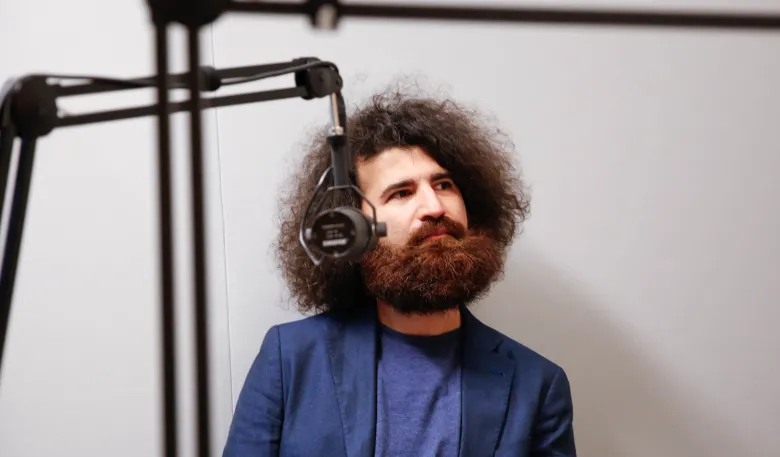
Mohammad Akbarpour is an associate professor of economics at Stanford GSB. | Julia Yu
“As we are sitting here, multiple economists are think- ing about the problem of ticket allocation because it’s a really difficult problem. So everything starts by this observation that if Taylor Swift concert tickets are allocated completely based on competitive equilibrium or free markets, then people who are going to be able to go to this concert are not necessarily people who love Taylor Swift the most…. If someone is willing to pay $1,000 for a Taylor Swift concert, they do not necessarily get more value from going to a Taylor Swift concert than someone who is willing to pay $500.”
Daniela Saban on designing more useful dating apps
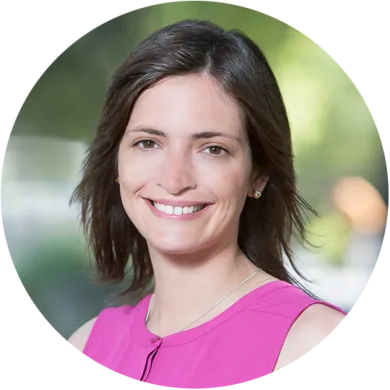
Daniela Saban is an associate professor of operations, information, and technology at Stanford GSB. | Nancy Rothstein
“The challenge is that if you just look at preferences, many people would like the same thing or would like the same person. And, of course, you cannot match everyone with the same person…. Now when it comes to retail, I may want to show you things that you’re likely to buy. And that’s great. When it comes to dating apps, I not only want to show you people that you will like. I also want to show you people that will like you back. So that changes a bit the type of people that you will see, and the type of constraints that I need to take into account when I design these algorithms.”
Rebecca Diamond on how immigrants boost innovation
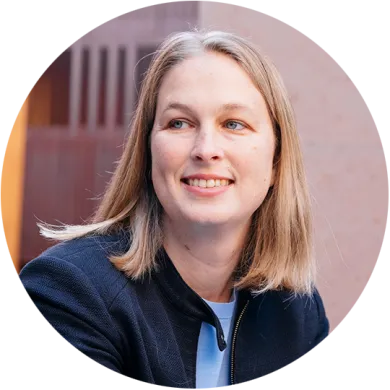
Rebecca Diamond is the Class of 1988 Professor of Economics at Stanford GSB. | Elena Zhukova
“The way to have successful innovation is not to just put smart people in a room by themselves and tell them,‘Think hard.’ It’s to collaborate and work together and create new ideas through the synergies of their knowledge. And immigrant knowledge seems particularly impactful on U.S.-born workers and inventors, and I think we potentially didn’t know how big of a deal that was…. [We found] that 36% of all innovation can be attributed to immigrants, because some of the U.S.-born production is attributable to the collaborations of immigrant coauthors. That’s a big number, suggesting that any policies that would limit or lower the number of immigrants coming to the U.S. for these super high-skill innovative jobs would have a large effect on future innovation.”
Ed deHaan on why accounting matters

Ed DeHaan is a professor of accounting at Stanford GSB. | Elena Zhukova
“Accounting is what they call ‘the language of business.’ It’s the backbone of communication within organizations and from organizations to outsiders. And when it’s working as designed, the only people who need to worry about it are the accountants, the managers, who are using the accounting reports… and then the investors who analyze the report[s]. So when it works, it facilitates everything in business…. And when it’s working well, it’s working well. And when it fails, we see catastrophic problems.”
Kuang Xu on our emotional responses to artificial intelligence

Kuang Xu is an associate professor of operations, information, and technology at Stanford GSB. | Elena Zhukova
“The biggest thing is when people hear ‘AI,’ their brain kind of shuts down a little bit, right? It’s kind of like a fight or flight response…. It’s like, ‘Oh my God. I don’t know what this AI thing is.’ And the thing I want to drive home is, for businesses like that, a huge chunk of knowledge is not new, and to know where to insert a new thing is a beautiful art. And that drives a lot of efficiency and value.”
Baba Shiv on how mindset affects our decisions
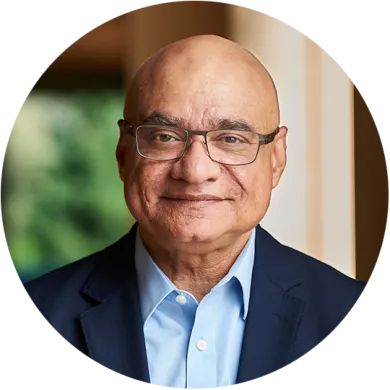
Baba Shiv is the Sanwa Bank, Limited, Professor of Marketing at Stanford GSB. | Drew Kelly
“In the real world, there are no successes or failures. Just think about it. You make a decision. There’s only an out- come. It is the brain that has to interpret that outcome as a success or a failure. And any outcome is going to be in the form of a distribution. There are going to be some positives; there are going to be some negatives.
“Now, if you are confident about the course of action you’re taking — you have visualized the whole thing, you believe with true conviction that, ‘Yes, there are going to be stumbling blocks along the way. Of course, it’s going to happen. That’s reality. But I am going to reach an endpoint I’ll be happy with’ — if you have that conviction out there, and there’s an outcome which has got both positives and negatives, which side of the distribution are you going to sample from? Naturally, the brain is going to sample from the positive end of the distribution. And therefore, it is going to become a self-fulfilling prophecy.”
Jonathan Levav on influencing people’s decisions
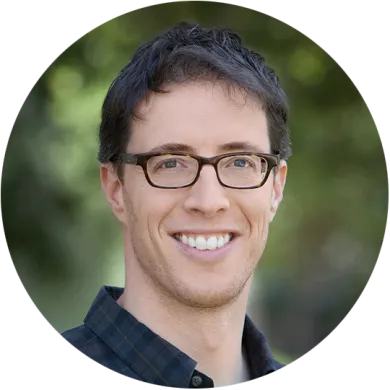
Jonathan Levav is the King Philanthropies Professor of Marketing at Stanford GSB. | Nancy Rothstein
“Suppose you want to get someone to engage in a certain behavior…. The approach of choice architecture says,‘Wait, if I designed a decision environment taking into account people’s psychological tendencies and the way the mind works, then I can influence people’s decisions by virtue of the situation, right?’… One of the philosophers of business that I love quoting in my class is the rapper Snoop Dogg. And Snoop Dogg says that it’s too easy for kids to join gangs and do drugs. We should make it easy to do football and academics. He’s absolutely right. He has the intuition for choice architecture: Make easy the decision that you want people to make, and then they’re more likely to make it.”
Szu-chi Huang on our reaction to stories about heroic robots

Szu-chi Huang is an associate professor of marketing at Stanford GSB. | Elena Zhukova
“Watching the robot stories actually makes people feel less inspired and less encouraged, and that has important consequences such as making them donate much less than people who watched the human heroes. That’s why we believe this is an important effect to document because all these YouTube videos about hero robots are everywhere. We are watching them every day, and if it lowers our prosocial motivation and our intention to help others, it could have a pretty big negative social impact.”
Ken Shotts on companies acting on their values
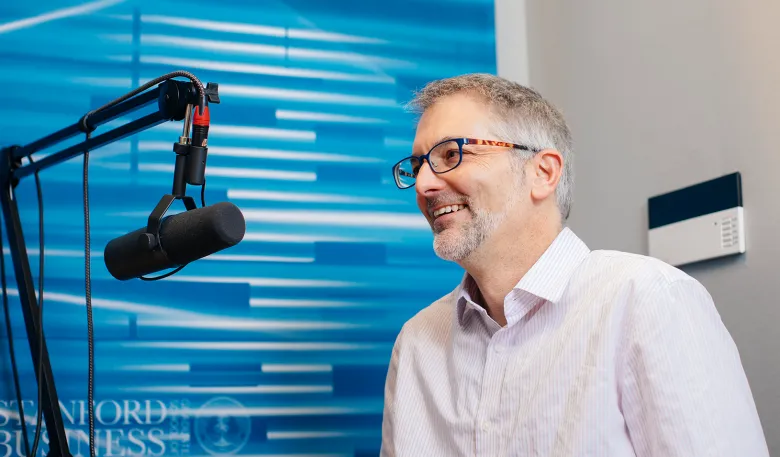
Ken Shotts is the David S. and Ann M. Barlow Professor of Political Economy at Stanford GSB. | Elena Zhukova
“I think it’s crucial that the people closest to us know what our core values are. And I think in many organizational contexts it’s important for people to know what the leadership’s values are…. It’s a challenge that a lot of companies face: are we going to take positions on lots of things or are we not going to take lots of positions on lots of things? And I think there’s an argument that, and this probably varies by company, but there’s an argument to be made that companies shouldn’t take positions on as many things as they do sometimes and that when they do take positions on something, it should actually be very carefully grounded in their core values and principles. People shouldn’t be surprised that this is the company’s position on a particular issue if it’s really coming from something deep within the company.”
Andy Hall on what’s driving political polarization

Andrew B. Hall is the Davies Family Professor of Political Economy at Stanford GSB. | Elena Zhukova
“When you look into what’s going on with polarization and dysfunction in American politics, one of the most surprising facts that is pretty well documented in political science — but not very well understood by most people outside of political science — is that it’s pretty clear that polarization is disproportionately being driven by our politicians, by our parties… and our interest groups much more so than voters. Voters are actually not as polarized as you might think…. If you actually look at the distribution of what the American people as a whole think, [it] is remarkable how in the middle they are on most issues.”
Darrell Duffie on the future of a digital dollar
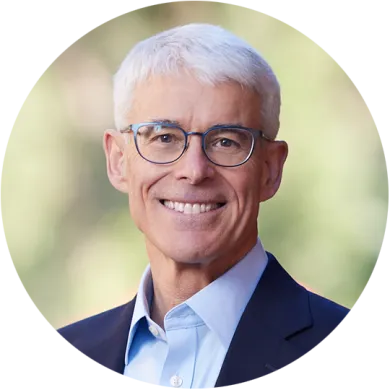
Darrell Duffie is the Adams Distinguished Professor of Management and Professor of Finance at Stanford GSB. | Nancy Rothstein
“It’s hard to imagine that a hundred years from now, people will be reaching into their pockets and pulling out grubby bits of paper. I imagine eventually we will be using digital dollars and not using paper money — to the extent that we use any government currency. Now, would we go to an all-government digital dollar? Would we go to bank digital dollars, meaning your commercial bank deposits being digitized? It’s really a hard one to call.”
“I think that’s the biggest hope in our lifetime, which is that the advent of digital currencies and better regulation for competition and innovation will trigger improvements in the way that we make payments with other forms of private money. Maybe eventually, though, we’ll get to the point at which digital dollars are used.”
For media inquiries, visit the Newsroom.
Explore More
Interim GSB Dean Named as Search Process Begins

Changemakers: Teaching Young People a Recipe for Success in the Restaurant Industry

Stanford GSB Professor Neil Malhotra Named Carnegie Fellow
